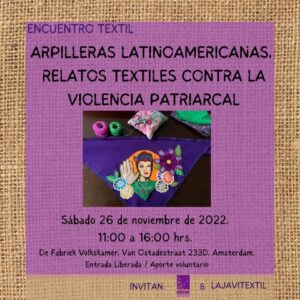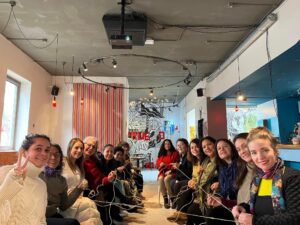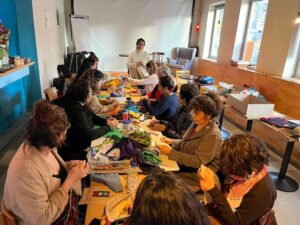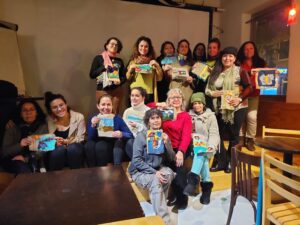En el Día Internacional de la Eliminación de la Violencia contra la Mujer, nos reunimos en De Fabriek Volkskamer para crear juntas un espacio de sororidad entre mujeres de la comunidad latinoamericana, caribeña e hispanohablante, que nos permitió compartir nuestras experiencias y reflexionar juntas sobre cómo vivimos, nos protegemos y nos organizamos para eliminar la violencia contra las niñas, las jóvenes, las mujeres y las disidentes migrantes en Países Bajos.
Reconociendo la relación histórico-política de las mujeres organizadas con lo textil, queremos utilizar las telas, agujas e hilos, como medios de expresión, protección y creación, e inspirarnos especialmente en la Arpillera chilena y Latinoamericana, por la fuerza, emotividad y valentía de su relato, que narra en tela, tanto los amores y dolores de las mujeres que las confeccionan, como las luchas y resistencias ante las injusticias, discriminaciones y desigualdad que nos violentan, día a día.
Quisimos promover un espacio de reflexión, de asociatividad y creatividad, seguro y respetuoso de la diversidad de experiencias, visiones e ideas, en el que nos una la convicción de que en la organización social y comunitaria de mujeres, se encuentra la clave para avanzar en el desarrollo de una sociedad respetuosa de la diversidad, equitativa, con igualdad sustantiva para todas las personas y sostenible para las generaciones presentes y futuras.




ENGLISH VERSION:
Textile Encounter, Chilean and Latin American Arpilleras: Textile stories against patriarchal violence.
On the International Day for the Elimination of Violence against Women, we gathered at De Fabriek Volkskamer at the Volkskamer to create collectively a save space of sisterhood among women from the Spanish-speaking community. This allowed us to share our experiences and reflections about the society we live in, so that we can protect ourselves and organize future actions to eliminate the increasing violence against girls, women and the lgbtqia+ community in the Netherlands.
We consider that there is a strong historical-political relationship of women with textiles. Therefore we use fabrics, needles and threads as a means of expression, protection and creation. We are especially inspired by the Chilean and Latin American “Arpillera”, the term with which the outstanding Chilean folklorist Violeta Parra baptised her embroideries on rustic fabrics who were used to make sacks for agricultural products.
“Arpilleras are like songs that are painted”, said Violeta Parra. It would later become a long popular textile tradition cultivated by hundreds of women in Chile as an act of resistance and denunciation against the Pinochet dictatorship.
That’s why we have embraced the Arpillera, because it it’s a beautiful way to express emotions and to tell a story. It is difficult to talk about the emotional struggles and violence we face on a daily basis. That’s why we promote a space were women can reflect, create and express their emotions without the need to talk if they don’t want to. The Arpillera is the way of expression.
